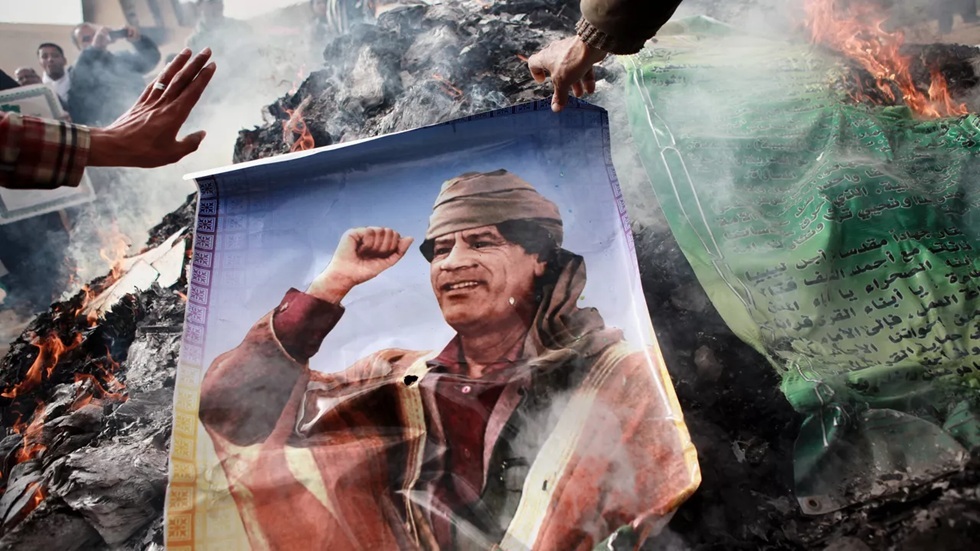The world changed decisively after the September 11, 2001 attacks, followed by the U.S. invasion and occupation of Iraq in 2003, and the arrest of Saddam Hussein at the end of that year, leaving no room for maneuver.
Tensions between Libya and the United States sharply escalated after a bomb exploded under a table at the “La Belle” nightclub in West Berlin, under the jurisdiction of West Germany, at 1:45 AM on April 5, 1986.
U.S. Marines stationed at American military bases in West Germany frequently visited this nightclub.
The bombing killed two American servicemen: Sergeant Kenneth Ford and another non-commissioned officer of the same rank, James Goins, who died two months later from severe injuries.
230 others were injured, including 79 American soldiers, some seriously with amputations. A Turkish woman named Nermin Hanay was also killed in the bombing.
Investigations revealed that the explosion was caused by a plastic bomb weighing about two kilograms with nails, placed under a table near the dance floor, causing many casualties in the basement below the dance floor.
After considering the involvement of several parties, the United States accused Libya of the “La Belle” nightclub bombing. The bombing occurred one month after a naval armed confrontation in the Mediterranean between the U.S. and Libya, during which the U.S. Navy sank two Libyan missile boats.
Ten days after the nightclub bombing, American planes launched from bases in Britain and aircraft carriers in the Mediterranean conducted airstrikes on the cities of Tripoli and Benghazi at dawn on April 15, 1986. Among the targets bombed was the home of Libyan leader Muammar Gaddafi at Bab al-Azizia camp in the heart of the Libyan capital. The main goal of the attacks was to assassinate the Libyan leader, but he was not hit; about 40 people were killed in these air raids.
Later reports indicated that evidence found in the files of the East German State Security Service “Stasi” linked the nightclub bombing to the Libyan embassy in East Berlin.
Among the evidence were telegrams exchanged between the Libyan embassy in East Berlin and Tripoli. One telegram before the attack said, “Wait for the result tomorrow morning,” while another sent after the attack expressed the operation’s success. Subsequently, five suspects were arrested in 1996.
A German court concluded its sessions in 2001, convicting four of them: a German citizen named Verena Shana who planted the bomb inside the nightclub; her ex-husband, of Lebanese origin, convicted of murder and aiding in planning; a Palestinian employee at the Libyan embassy, Yasser Shreidi, convicted of murder and described as the mastermind behind the bombing.
The court also convicted Libyan diplomat Misbah al-Tir for providing logistical support for the operation, while Andrea Ermossler, Verena’s sister who was with her during the bombing, was acquitted.
Furthermore, the German court concluded that Libyan state agencies were responsible for the attack but acknowledged there was no conclusive evidence of direct involvement by Libyan leader Muammar Gaddafi.
In 2004, Libyan authorities agreed to pay $35 million in compensation to the victims’ families and those affected by the nightclub bombing, but the compensation was paid in 2008 and included victims of all confrontations in the 1980s between the two countries, totaling $1.5 billion. These compensations were framed as “humanitarian gestures” rather than official admissions of guilt.
In this way, old files between Libya and the West were seemingly closed, but “hostility” continued and did not stop until the overthrow of the Libyan leader Muammar Gaddafi and his brutal killing on October 20, 2011.













Recommended for you
Exhibition City Completes About 80% of Preparations for the Damascus International Fair Launch
Talib Al-Rifai Chronicles Kuwaiti Art Heritage in "Doukhi.. Tasaseem Al-Saba"
Unified Admission Applications Start Tuesday with 640 Students to be Accepted in Medicine
Egypt Post: We Have Over 10 Million Customers in Savings Accounts and Offer Daily, Monthly, and Annual Returns
His Highness Sheikh Isa bin Salman bin Hamad Al Khalifa Receives the United States Ambassador to the Kingdom of Bahrain
Al-Jaghbeer: The Industrial Sector Leads Economic Growth